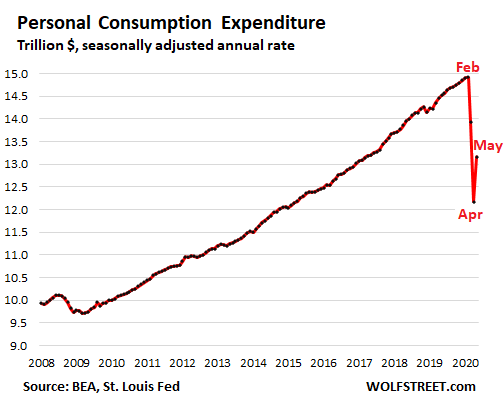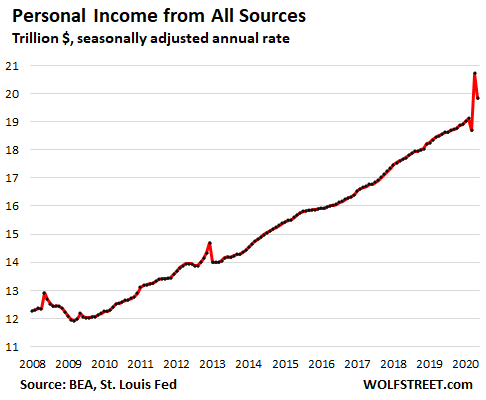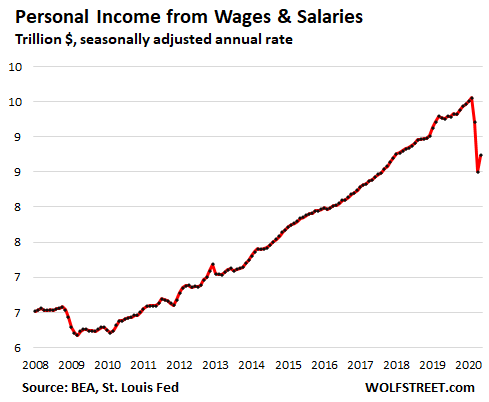A Federal-Money-from-the-Sky Story
by Wolf Richter, Wolf Street:
 Household Income Drops from Historic Spike, Spending Bounces off Historic Plunge But Remains Low. Income from wages and salaries remains crushed.
Household Income Drops from Historic Spike, Spending Bounces off Historic Plunge But Remains Low. Income from wages and salaries remains crushed.
The $2,400 in stimulus that a couple received in April made a great down-payment for a car in May. If it was used as a down-payment, the loan itself multiplied the consumer-spending effect. Instead of spending $2,400 on other stuff, the couple might have spent $24,000 on the car, with rest of the money being borrowed. But it’s the $24,000 that counts as consumer spending in May, and the $2,400 that counted as income in April.
And so, consumer spending in May jumped by 8.2% from April, to a seasonally adjusted annual rate of $13.16 trillion, according to the Bureau of Economic Analysis this morning, as households spent this federal money-from-the-sky. But compared to May last year, spending remained down 9.3%, after having collapsed by a historic 12.6% in April. The May bounce, as magnificent as it was, brought spending back to where it had been in March 2017 and reclaimed only about one-third of the decline since February:

Income is a federal-money-from-the-sky story that has begun to unwind in May and will unwind further in June and July unless more federal manna gets dropped on the people.
Household income in May dropped from April. April was the month when many households had received their stimulus checks – $2,400 per couple and more if they had kids. And those who’d gotten laid off started getting the extra $600 a week in federal unemployment compensation, in addition to their state unemployment compensation. For many laid-off workers, this increased their total unemployment compensation beyond their actual earnings. This combination of stimulus and the extra $600 a week had produced a record spike in household income in April. In May, income began falling back to earth.
In March, income had dropped 2.2% from February because people were getting laid off in mid-March, and the stimulus checks and unemployment checks had not arrived yet. In April, the federal money started dropping from the sky onto the people, and income soared by 10.8% from March.
In May, that federal money was still dropping from the sky, but at a reduced rate as many people had already gotten their stimulus checks, and income dropped by 4.2% from April. In dollar terms, income in May fell to a seasonally adjusted annual rate of $19.84 trillion, from the stunning federal-money-from-the-sky record in April:

Without the stimulus manna, personal income just from wages and salaries had dropped in April by 7.6% to the lowest level since September 2017. In May, it ticked up one tiny bit from those low levels to a seasonally adjusted annual rate of $8.73 trillion:

The stimulus funded many things, from food to garden supplies and bicycles. Many of these retail categories have soared in March, April, and May. A lot of it was spent online. Since vacations to distant locations were off the table, this money was mostly spent in the US, though much if it was spent on imported goods.



